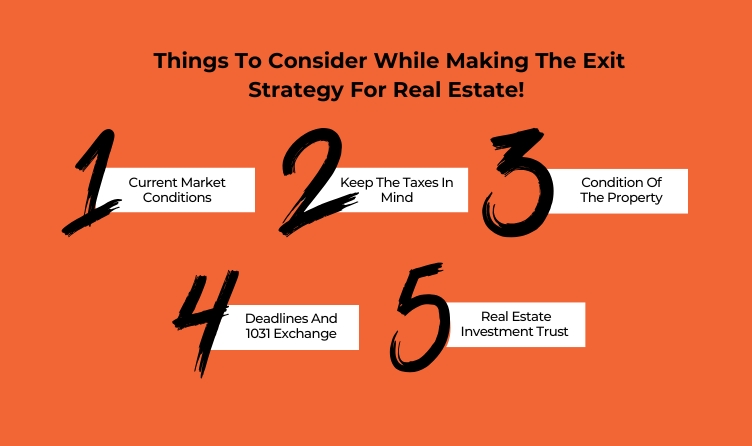A Comprehensive Guide to Formulating the Right Real Estate Exit Strategy so That You can Jump Ships when Needed
6 Mins Read
Published on: 05 May 2023
Last Updated on: 21 November 2024

toc impalement
Are you searching for different ways of having a real estate exit strategy in 2024? If your answer is a YES, then you have reached the end of your search!
Developing a real estate exit strategy for your commercial real estate investments is essential in ensuring a triumphant return on your investment.
By considering your goals, market conditions, tax implications, and the state of the property, you can make a well-informed decision on the best exit strategy for your situation.
Keep reading this blog till the end to learn more about the same…
Ways to Have A Real Estate Exit Strategy!
Developing an exit strategy for your commercial real estate investments is an essential part of the investment process. An exit strategy is a plan to dispose of your property and realize your profits. There are several options for exiting a commercial real estate investment, each with its pros and cons.
1. Selling The Property
One option is to sell the property. This is a common exit strategy for commercial real estate investors, allowing them to quickly realize their profits and move on to new investments. However, selling a property can be time-consuming and may only sometimes result in the highest price.
Additionally, the real estate market can be unpredictable, timing the sale of a property complex. To get the most eyeballs on the property, you can sell office space or retail space on online marketplaces.
2. Collect Rental Income By Retaining Property
Another option is to hold onto the property and collect rental income. This can be a good option for investors who want to generate passive income and benefit from long-term appreciation of the property’s value.
However, holding onto a property also means that the investor is responsible for the property’s maintenance and management, which can be time-consuming and costly.
3. Refinance Your Property
A third option is to refinance the property. Refinancing allows investors to take advantage of lower interest rates and increase their cash flow by reducing monthly mortgage payments.
This can be an excellent way to extract equity from the property while still retaining ownership. However, refinancing also means taking on more debt, which can increase the investor’s risk.
4. Exchange it for Another Property
Another option for exiting a commercial real estate investment is to exchange it for another property through a 1031 exchange. A 1031 exchange, also known as a “like-kind exchange,” allows an investor to sell properties and use the proceeds to purchase another property.
Without paying taxes on the capital gains from the sale. This can be a valuable tool for investors who wish to defer taxes on their profits. It can also allow them to upgrade to a more desirable property or diversify their portfolio.
5. DST May Come in Handy
Another option that is becoming increasingly popular is a Delaware Statutory Trust (DST). A DST is a trust created under the laws of Delaware that holds title to a specific property and allows multiple investors to own and invest in the property jointly.
This can be a good option for investors who want to invest in commercial real estate but want to avoid the responsibility of managing the property. DSTs are also great for those who wish to defer capital gains taxes and avoid UDFI taxes (unrelated debt-financed income) when using leverage.
6. Have A Joint Venture
A final option is to enter into a joint venture. This can be an excellent way to bring in additional capital and expertise to help grow the property. However, it also means sharing control and profits with a partner, which can be difficult for some investors.
Things to Consider While Making the Exit Strategy for Real Estate!

Now that you are aware of the different real estate exit strategies, it is time for you to take a look at some of the things that you need to consider and keep in mind while making one. Take a look at some of these before you leave!
1. Current Market Conditions
One critical aspect to consider when developing an exit strategy is the current market conditions. It is essential to stay informed about the state of the real estate market and understand how it may affect your ability to sell or refinance your property.
For example, if the market is currently in a downturn, it may be more challenging to sell a property for a high price, and it may be more advantageous to hold onto the property until the market improves.
On the other hand, if the market is currently experiencing growth, it may be an excellent time to sell a property to capitalize on the increased demand and higher prices.
2. Keep the Taxes in Mind
Tax considerations are also an essential factor to consider when developing an exit strategy. Different exit strategies can have other tax implications, and it is vital to understand how these implications may affect your overall return on investment.
For example, selling a property can trigger capital gains taxes, while holding onto a property can generate a passive income subject to regular income taxes. Consulting with a tax professional can help you understand the tax implications of different exit strategies and make the best decision for your situation.
3. Condition of the Property
In addition, It’s also important to consider the condition of the property and any potential repairs or renovations that may be needed before exiting the investment.
Knowing the state of the property and the cost of any necessary repairs or renovations can help you determine a realistic sales price or rental income. It can also help you plan for expenses incurred during the exit process.
4. Deadlines And 1031 Exchange
It’s important to note that some strict rules and deadlines must be met to qualify for the 1031 exchange. The properties involved in the exchange must be considered “like-kind,” which generally means that they must be used for the same purpose, such as investment or business.
Additionally, it is mandatory for the investor to identify a replacement property within forty-five days of the sale of the original parcel and must close on the replacement property within 180 days of the sale of the actual property.
5. Real Estate Investment Trust
A final option is using a Real Estate Investment Trust (REIT). This is a company or group that owns, manages, as well as finances the real estate that produces income.
Investors can purchase shares in a REIT, which gives them a stake in the ownership of the underlying properties. REITs are a liquid investment, meaning claims can be bought and sold on stock exchanges like company shares. REITs can provide a steady income stream through dividends and offer the potential for appreciation in value.
| NOTE: It is always recommended to seek professional guidance from a real estate advisor, tax professional, and an attorney to help you develop and implement a strategy to help you meet your goals and optimize your return on investment. |
Bottom Line
In conclusion, there are many options for exiting a commercial real estate investment, each with pros and cons. It is essential to carefully consider your goals, market conditions, tax implications, etc. when developing an exit strategy.
Some of the most common options include selling the property, holding onto the property, and collecting rental income. Subsequently, you can also consider refinancing the property, entering into a joint venture, 1031 exchange, DST, and REITs.
It is always recommended to seek professional guidance from a real estate advisor, tax professional, and an attorney to help you develop a strategy. This can help you meet your goals and optimize your return on investment.
I hope that this blog has provided you with enough relevant information about the real estate exit strategy. If you have any other questions or confusion related to this topic, please feel free to comment. I will be there to help you out with that as soon as possible.
Read Also:


















Comments Are Closed For This Article